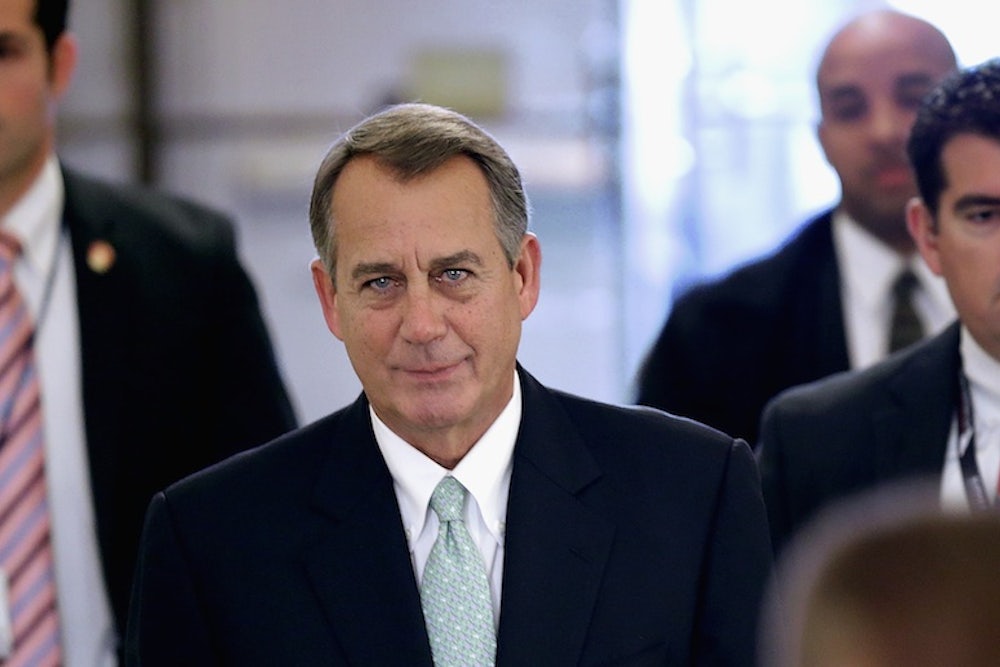This evening’s NBC/WSJ survey was absolutely brutal for Republicans. The president’s approval rating is up, more voters blamed Republicans for the shutdown than did in 1995, and the GOP’s favorability slipped to its lowest level in the history of the NBC/WSJ survey. But there was one question where the numbers weren’t catastrophically bad for Republicans. Unfortunately for Democrats, it’s the single most important gauge of how the Republicans might fare in the midterms.
The generic ballot question measures whether voters want Republicans or Democrats to control Congress, and it correlates strongly with the outcome of national congressional elections. Before the shutdown, polls showed Democrats and Republicans deadlocked in the low-forties, which would have easily allowed Republicans to retain control of the House, or even allowed Republicans to gain seats. Last night’s NBC/WSJ poll showed Democrats faring much better, ahead by 8 points, 47-39—a 5 point improvement from their last survey, when Democrats led 46-43.
Unlike those surveys about “blame” or those polls from PPP and Gallup, an 8 point Democratic advantage on the generic ballot cannot be dismissed. That’s inching into the danger zone—the area where we can entertain the possibility of Democrats taking control of the House.
But an 8 point edge doesn’t make a Democratic takeover likely. Far from it. The House playing field is tilted so heavily in the GOP’s direction that Democrats will probably need a double-digit edge to take back the House.
The 2006 midterm election, when Democrats gained picked up 30 Republican-held seats, is a helpful illustration. In October 2006, two NBC/WSJ surveys showed Democrats with a massive 15 point edge, 52-37. But that 30 seat gain was heavily dependent on lean-Democratic turf: Democrats won ten of 18 Republican-held districts with a Cook PVI of D+2 or greater. The remaining 20 seats came from districts that tilted Republican and a handful of Republicans facing ethical challenges, like Tom Delay.
But in 2014, Democrats won’t have as many opportunities. There are only two Republican-held districts with a Cook PVI of D+2 or greater. There are also fewer Republican-held districts with a PVI of “even” or R+1. So if Democrats do as well in 2014 as they did in 2006, they’ll gain far fewer seats, simply because the best pick-up opportunities are already held by Democrats. Or put differently: without eight or nine pick-ups in lean-Democratic districts, a 2006-esque wave would only barely get the Democrats over the 17 seat threshold they need to take back the House in 2014.
The lack of GOP exposure to a Democratic wave is why Alan Abramowitz of Emory University calculates that Democrats need an advantage of about 13 points to retake the House in 2014. His model estimates that an 8-point advantage would result in a Democratic gain of about 8 seats—less than half of the number necessary to retake the House. I'm not sure whether I agree with those numbers (I'm unsure about the linearity), but it's close enough.
And the other polling doesn’t point toward a big double digit Democratic advantage on the generic ballot, either. Quinnipiac and Democracy Corps, two well-respected live interview surveys, put the Democrats ahead by 9 and 4 points, respectively. Once again, these figures trail the double digit margins held by Democrats in Quinnipiac and Democracy Corps surveys from October 2006.
Later surveys might find the Democrats building an even larger lead. If so, the possibility that Democrats will take back the House should be taken even more seriously. But how much better can it really get for Democrats? Isn’t this a moment of historic revulsion at the GOP? If Democrats aren’t generating a huge lead in the generic ballot now, when will they?
Even without asserting that the shutdown is the GOP’s nadir, there are other reasons to question whether today’s Democratic advantage will endure for the next 13 months. Political scientists have found that the Democratic-edge in the generic ballot tends to fade over the year before an election. That might be especially true in 2014, since the economic fundamentals and the president’s approval rating aren’t exactly consistent with huge Democratic gains. Perhaps that's why NBC/WSJ shows more Republicans switching to undecided than actual Democratic gains. In this political environment and with an incumbent Democratic president, it's hard to imagine too many Republican-leaners voting for a Democratic House.
And just think about all that’s transpired over the last thirteen months. The election, the fiscal cliff, Newtown, immigration, the sequester, the IRS, NSA, Syria, and now a government shutdown. If the last 13 months are any indication, the shutdown could be a distant memory in November 2014.
